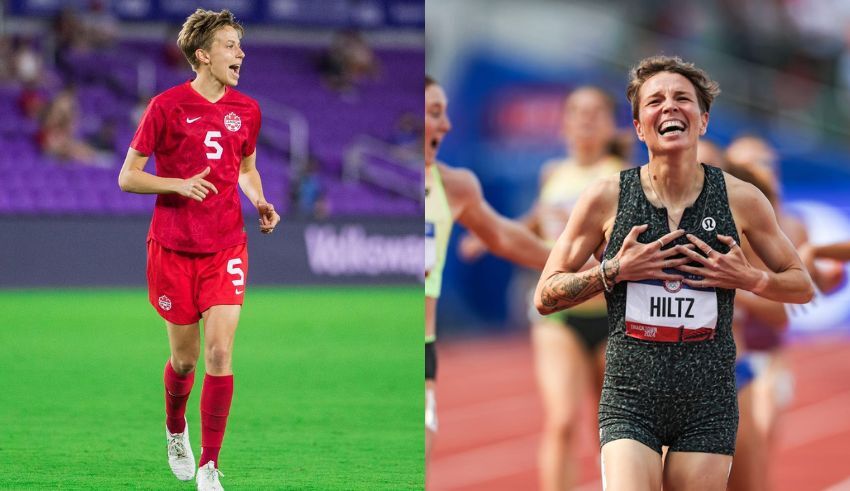
Two transgender athletes will be competing in the 2024 Paris Olympics, therefore marking a historic turning point in sports. This unheard-of involvement has prompted a worldwide dialogue on inclusivity, justice, and changing conceptions of gender in sports. These sportsmen’s participation in such a famous event highlights the continuous movement toward more acceptance and equality in the field of sports, therefore reflecting larger social developments.
Nikki Hiltz: A Middle-Distance Running Trailblazer
By making it on the U.S. Olympic team in the women’s 1500 meters, non-binary athlete Nikki Hiltz has created history. Their path to the Olympics has been one of tenacity and will marked by both successes and setbacks. Hiltz has been outspoken about the need of inclusion and advocacy for transgender athletes negotiating the challenging rules controlling their involvement. Many others who go through comparable hardships find inspiration in their courageous and tenacious narrative.
Along with physical prowess, Hiltz’s path to the Olympics is about shattering stereotypes and questioning accepted wisdom. Emphasizing that athletics should be a venue where everyone, regardless of their gender identification, they have utilized their position to campaign for the visibility and acceptance of transgender athletes. Their appearance on the Olympic podium is a striking evidence of the development achieved as well as the work remaining to be done to support diversity in sports.
The Complexities of Sport Trans Inclusion
The participation of transgender athletes in sports has generated strong discussion and emphasizes the subtleties and complexity of this problem. Proponents contend that exclusion of athletes depending on gender identification is discriminatory and that participation should be based on personal ability. They stress the need of building an inclusive atmosphere whereby any athlete may participate fairly and without discrimination.
Conversely, some detractors express worries about possible unfair advantages—especially in strength-based sports. They contend that because of physiological differences, transgender women—for example—may have physical benefits over cisgender women. This has sparked a divisive argument on how to strike a balance in fair sports between inclusiveness and equity.
Globally, sports regulating bodies are struggling with these problems trying to strike a balance between justice, inclusion, and safeguarding of women’s sports. Policies in development aim to solve these issues so that every athlete may compete on a fair playing field. These changing rules will surely find a testing ground at the Paris Olympics, maybe forming standards for next events.
Beyond the Debacle
Although the debate around transgender athletes receives most attention, it is important to keep in mind that these people are mostly athletes aiming for excellence. Their Olympic attendance is evidence of their commitment, diligence, and tenacity. Their successes and the sacrifices they have made to ascend the highest in their professions should not be overshadowed by the conversations and arguments.
By pushing the envelope and supporting a more inclusive and fair athletic environment, Nikki Hiltz and other transgender athletes are opening the path for next generations. Their tales show the value of tenacity and the need of representation. The scene of sports will change as society develops; the 2024 Paris Olympics marks a turning point in this continuous dialogue.
The more general consequences
Including transgender competitors in the Olympics has wider consequences than those related to sports. It captures the continuous social change toward more acceptance of many gender identities. Public view can be much changed by this visibility, therefore fostering understanding and acceptance and helping to destroy preconceptions.
Moreover, the debates about transgender athletes in the Olympics might affect policies and procedures in other spheres including healthcare, education, and employment. It emphasizes the need of building inclusive surroundings where everyone, regardless of their gender identification, may flourish and achieve.
Looking Ahead
Apart from the sports successes, the 2024 Paris Olympics will be historic for their wider social influence. Two transgender athletes’ involvement marks a change toward more inclusiveness and acceptance in the realm of sports. This historic event provides a window into a time when sportsmen will be honored for their skills and identities.
The Paris Olympics will be evidence of the progress achieved and the continuous attempts to build a more inclusive society even if the road ahead may still be paved with difficulties. Maintaining the discussion on gender inclusion in sports is crucial to make sure regulations and procedures change to represent the dynamic and varied character of society.
Finally, the inclusion of transgender competitors in the 2024 Paris Olympics marks a major advancement toward sports’ equalizing goal. It emphasizes the need of appreciating the diverse identities of sportsmen. Stories of Nikki Hiltz and other transgender athletes highlight the need of representation and the strength of tenacity. Watching the 2024 Paris Olympics will be seeing a mirror of a society in change, accepting diversity and working toward a more inclusive future, not only athletic ability.




